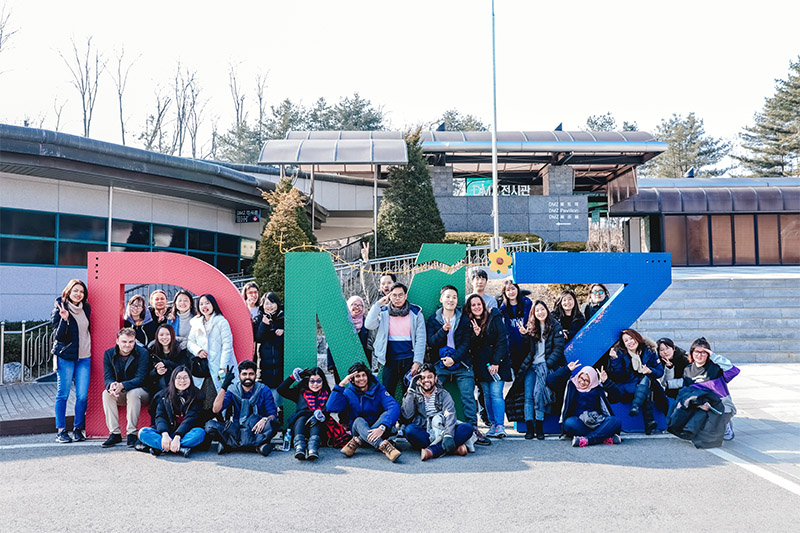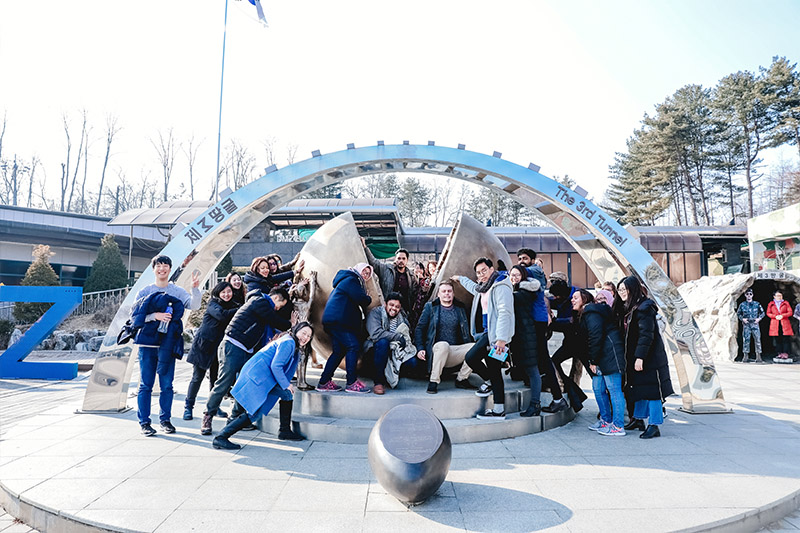Reviews 2019

Introduction

The Sixth International Course on Human Rights and Asia, organized and hosted by Seoul National University’s Human Rights Center, served as an invaluable platform for participants to think about the universality of human rights-particularly in Asian contexts-and to gain a deepened understanding of human rights issues in this region.
This year, the course brought together 20 participants from 16 countries: Brazil, Cambodia, China, India, Indonesia, Japan, Malaysia, Myanmar, Pakistan, the Philippines, South Korea, Sri Lanka, Thailand, the United Kingdom, the United States of America, and Vietnam. The participants came from diverse professional backgrounds, consisting of academics, activists, civil servants, employees of international organizations, lawyers, lecturers, legal consultants, and researchers. Participants were involved in a comprehensive and multidimensional learning program that included not only lectures, but also presentations, discussions, a field trip to the DMZ, and a visit to human rights organizations in Korea. Our course ultimately aims to foster an interdisciplinary study and multidimensional advocacy of human rights in Asia.
Approach and Contents of the Course


The key feature of the course was the discussion that allowed participants coming from different countries share their experiences and thoughts on human rights challenges. It gave a diverse perspective on the subject. In addition, the approach was beneficial in view of the increasing complexity and interconnectedness of human rights concerns globally. It empowered human rights advocates to gain a holistic view on various thematic issues.
A cross-cutting theme of this course was the economic and social rights. Also, the special lecture on the ‘Universal Declaration of Human Rights and Asia’ marked the 70th anniversary of the UDHR. The course syllabus covered economic and social rights in several perspectives such as Transnational Understanding, Human Rights Responsibility of Corporations, Gender Equality, The Role of Public Interest Litigation and Global Health Inequality. In each session, participants were able to learn from each field expert, interactively share their experiences and build on their academic knowledge. In addition to the lectures, participants shared their thoughts in a discussion session on the theme, ‘Can Human Rights Play a Transformative Role in this Increasingly Unequal World?’ based on a selected reading list.
Learning from South Korea’s Experience
– Visiting the DMZ and Human Rights Organizations


Participants were able to visit the Korean Demilitarized Zone (DMZ) and learn firsthand the reality of the division of Korea. At Dora Observatory, participants could catch a rare glimpse of North Korean territory and sense the current tragedy of national division. Visiting Imjingak Park and the Third Tunnel allowed them to experience and learn about the history of the Korean War. After the visit, a peace specialist gave a lecture on the system of division and its impact on peace and human rights in the region, providing participants with a perspective on the interplay between peace and human rights.
“It was a dream of mine as a human rights activist to know more about the DMZ. There is still more to be done” (Joel Mark Baysa BARREDO, Philippines)
“In the DMZ, I can see the tragedy of the proxy war which I heard before but cannot imagine how worst it was” (Arisara LEKKHAM, Thailand)


Participants had a chance to visit a human rights organization, based on their interests, and meet with their representatives. The three organizations that the participants visited were as follows: Advocates for Public Interest Law (APIL), South Korean NGO’s Coalition for Enactment of Anti-Discrimination Law and Korean People’s Solidarity Against Poverty. It was a great opportunity for the participants to engage directly with grassroots activists and learn from them about the human rights challenges faced by different communities in South Korea. The participants were able to gain useful insights on advocacy strategies from the organizations, which would enhance the participants’ work back home.
”The visit was one of the best experiences during the course. It would be interesting if the students could go for more than one, just because all of them seemed very relevant to the debates” (Mariana Yante BARRÊTO PEREIRA, Brazil)
”The organisation has provided us ideas on how we do our advocacy, but most importantly, inspired us that we can continue the fight for human rights despite the challenges that may be presented to us” (Rochelle Angela YU, Philippines)
Research/ Advocacy Plan
After the lectures, participants were given time to present their own research or advocacy plans based on their academic research projects and work experiences. Before the presentation session, each participant was able to consult with the course director, Dr. Joo-Young Lee, on developing their research or advocacy plan. The presentations addressed various human rights issues in Asia and explored how to promote human rights from academic, cultural, legal and practical perspectives. These assignments reflected the course’s intent for participants to apply their coursework to real-life scenarios. Case studies challenged participants to not only brainstorm on advocacy and research strategies, but also take into account various real-life restrictions and socio-political considerations. Generous constructive feedback from fellow participants suggested ways for presenters to refine their strategies and implement them in the real world.

Feedback from the participants
According to the course evaluation survey, 95% of the participants responded they were very satisfied with the overall course programme, and all participants responded that they would recommend this course to others.
“I like the course because it gives me a solid foundation, as someone who has non-law background, to conduct my activisms either in Indonesia or in the region”
Cornelius Damar HANUNG (Indonesia)
“First of all I found all logistics very well organized and thought which really reminded me of how this course has been accumulating all the experiences and lessons learned from the previous years. Second, I loved the diversity of the participants including professions experiences nationality etc so i learned a lot just by speaking to them throughout the course. Third, lectures were really interesting in the way that there were so many different aspects handled by all different experts from all over the world. Lastly for the presentation session, I really appreciated the tutorial and also feedbacks from colleagues”
Hyun Shin JUN (Republic of Korea)
“It is very interesting and inspiring course. The course not only provided me with professional knowledge and understandings but also helped me in creating network to develop human rights activities in my areas in the future”
Thi Mai LE (Vietnam)
“It’s been an incredible experience, for both the lectures and to also meet my fellow participants, all of whom are doing incredible things. Thank you so much for this opportunity!”
Rachel ROSTAD (USA)
“Overall, I am very satisfied with the course. I have learned more about human rights in general, and it has sharpened my understanding on the topic of my interest. I also enjoyed the discussions during lectures. Some colleagues raised important and thought-provoking questions that make me rethink about my own research, its relevance and impacts”
(Anonymous)
“I think it is a great way of fostering engagement and developing human rights in Asia. The comparative approach that naturally came with the even distribution of participants across Asia and some parts of the world helped tremendously. I found the lectures and my peers at the course have only enriched my understanding of the issues affecting the region. The organisation is also excellent. I felt very well taken care of throughout the two weeks. Keep it up”
(Anonymous)

